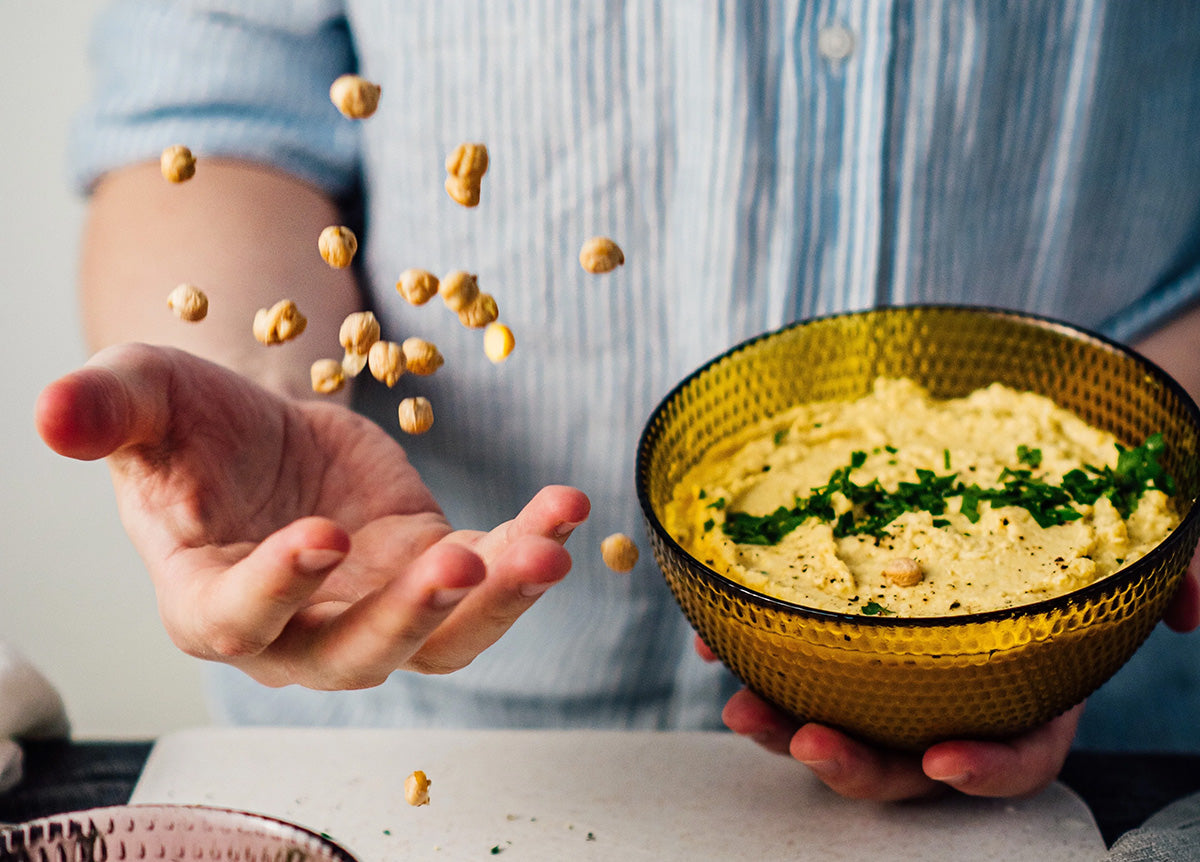Less than a decade ago, those identifying as vegan or plant-based were often viewed as weird or extreme. References to veganism and other plant-based diets in the mainstream media were also often negative. Many headlines made veganism sound like a surefire way to become scrawny and malnourished.
Plus, plant-based food options used to be difficult to find in restaurants, grocery stores, and online—and even then, they weren’t always appetizing. But now, as Bob Dylan would say, the times they are a-changin’.
The number of vegans across the globe is skyrocketing and plant-based food options are now plentiful.[*] Even fast food giants, including Burger King and McDonald’s, have plant-based options on their menus (although we wouldn’t recommend becoming a regular at these establishments).
While you’ve likely noticed the increased popularity of plant-based eating, do you know what a vegan diet entails and the benefits it offers? If not, you’ve come to the right place! We’ll be covering the basics of a vegan diet in this article.
What Is a Vegan Diet?
A vegan diet eliminates animal-derived foods for ethical, health, or environmental reasons. This includes meat, fish, seafood, dairy, eggs, honey, and any other products of animal origin. Those who identify as vegan also typically aim to exclude animal exploitation and cruelty in all areas of their lives, including the clothes they wear, the cosmetics and personal care products they use, and the leisure activities they partake in.
Vegan vs. Plant-Based and Vegan vs. Vegetarian
The terms “plant-based” and “vegan” are often used interchangeably, but there is a key difference. On a plant-based diet, the vast majority of food a person consumes comes from plants, however, some plant-based eaters include small amounts of animal products. For the purposes of this article, however, we’ll use the terms “plant-based” and “vegan” interchangeably.
Vegan diets and vegetarian diets are also often confused. Those eating a vegetarian diet omit meat, fish, and seafood, but still eat other animal-derived products, including eggs, dairy, and honey.
Health Benefits of a Vegan Diet
So, what’s driving thousands of people to ditch (or drastically reduce) their consumption of animal products? While ethical and environmental reasons are certainly motivators for many, the most common motivation is improved health.
When done right (i.e. eating well-balanced meals), a vegan diet offers a range of impressive health benefits, including:
- Improved heart health: A large-scale 2019 study found that a higher intake of plant-based foods and a lower intake of animal foods were associated with a reduced risk of heart disease and death in adults.[*] This isn’t surprising when you understand that animal products, including meat, cheese, and butter, are the main dietary sources of saturated fats. Plant foods are also rich in fiber, which is linked to better heart health and decreased mortality.[*]
- Lower cancer risk: According to a 2017 review, eating a vegan diet may reduce a person’s risk of cancer by 15 percent.[*] This health benefit is thought to be due to the fact that plant foods are high in fiber, vitamins, and phytochemicals that protect against cancers.
- Weight Loss: Vegan diets appear to be effective in helping people shed unwanted pounds. Several studies have found a link between a vegan diet and a lower likelihood of obesity.[*][*]
- Lower risk of type 2 diabetes: According to a large 2019 review, eating a plant-based diet can reduce your risk of type 2 diabetes.[*] The research linked this effect with eating whole plant-based foods, including fruits, vegetables, whole grains, nuts, and legumes.
What Foods to Eat on a Vegan Diet
Generally speaking, those eating a vegan diet fill their plates with fruits, vegetables, legumes, whole grains, nuts, and seeds.
There are, however, other interpretations of a vegan diet. For example, raw vegans only eat plant-based foods that are uncooked and unprocessed, while those following a vegan keto diet stick to low-carb, high-fat, moderate-protein plant foods.
It’s also important to note that just because a food is labeled “vegan” doesn’t necessarily mean it’s healthy. Oreos are vegan—and, let’s be honest, delicious—but they’re certainly not a food you should regularly include in your vegan diet if you care about your health.
That doesn’t mean that there aren’t any healthy packaged vegan foods out there. Take IQBAR, for example. Our plant-based protein bars are vegan, keto, paleo-friendly, and brimming with brain- and body-boosting nutrients. Plus, they only contain 1-2 grams of sugar and 2-3 net carbs per bar. The perfect pick-me-up to have on hand!
How to Get Protein as a Vegan
When people adopt a plant-based or vegan diet, one of the first questions they have is “how am I going to get enough protein?” Good news: if you’re eating a well-balanced vegan diet with adequate calories, you’ll almost certainly receive enough protein.
Vegan staples, including whole grains, legumes, soy, potatoes, nuts, seeds, and clean protein powders or protein bars, are all excellent plant-based protein sources. Aim to include these protein-rich foods in every meal and you’ll be golden!
Tips for Success on a Plant-Based Diet
If you’ve grown accustomed to eating animal products with every meal, switching to a vegan or plant-based diet might take some getting used to. Here are some tips that will make the transition as easy-breezy as possible and set you up for long-term success.
- Stock up on plant-based staples: Always keep your kitchen stocked with healthy, whole foods, including fresh and frozen fruits and veggies, whole grains, legumes, potatoes, nuts, and seeds. You can make tons of plant-based meals with these simple ingredients and countless recipes can be found online for inspiration.
- Eat enough: Plant foods are less calorie dense than animal foods. This means you’ll need to eat more volume to fill yourself up and get adequate calories and nutrients. Slowly make your portions bigger, allowing your stomach to get used to an increased volume of food.
- Track your nutrition: Speaking of getting adequate nutrition and calories, it can be helpful, at least initially, to track the foods you eat with an app such as Cronometer. By entering your daily food intake, you can see if you’re eating enough or lacking in particular nutrients.
- Take a B12 supplement: Because B12 primarily comes from animal products, vegans and plant-based eaters need to take a B12 supplement or eat foods fortified with B12, including some plant milks, some soy products, and some breakfast cereals. The recommended daily amount for most adults is about 2.4 mg, but check with your doctor to see what’s right for you.[*]
- Plan ahead: We’ve all gone grocery shopping while hangry and ended up with a cart full of junk food. To avoid mishaps like this, it’s important to keep healthy plant-based snacks on hand to keep you satisfied and nourished. Some good snack choices include fruit, trail mix, veggie sticks and hummus, and IQBARs.
If you’re interested in adopting a plant-based diet, don’t feel like you have to change everything overnight. Start by reducing the amount of animal products you eat and increasing your consumption of plant foods. The improvements you notice just might sway you to go all in!




